Pandemic Projects: Susan Hensel Explores the Effect of Substrate Color on Finished Objects
February 26, 2021
Susan Hensel is a multidisciplinary artist, with a 50+ year career, who combines a mixed media practice with embroidery across digital and manual platforms. She make sculpture and wall art using the colors and techniques of commercial embroidery, designed in the computer and stitched out on the computer-aided embroidery machine. This ongoing pandemic project is called Chromatic Book Blocks. When it is finished there will be al least 25 modules.
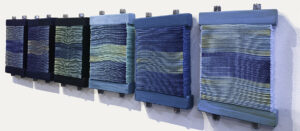
Susan Hensel Chromatic Book Blocks 2021, digital embroidery, mixed media. Photo by the artist.
How it started
Digital embroidery is not as automatic as it might appear. There are lots of opportunities for failure: broken needles, miscalculations, changes in humidity, and just plain chance. I keep boxes of failed stitch-outs for experimentation.
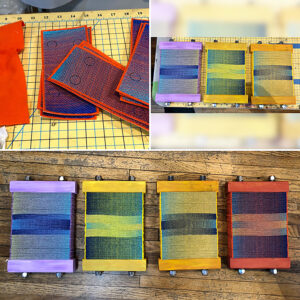
Chromatic Book Blocks image composite, 2021. Photo by the artist.
One pandemic afternoon, I got out that box. I considered all the what-if’s I could muster. What if it was upside down, sideways, folded, a different color. I was playing with a simple stitch-out that day and noticed how folding a rectangle of stitching intensified the color display. What if I chose three threads, designed open gradients that remained the same from stitch out to stitch out, but changed the color of the substrate? One thing led to another…
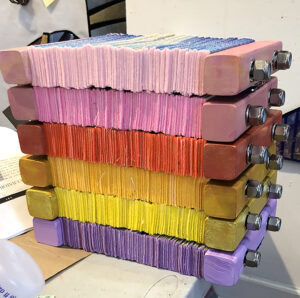
Chromatic Book Blocks Stacked, 2021. Photo by the artist.
The Set-up
I chose three threads royal blue, gold ochre, and aqua. These are trilobal polyester embroidery threads. Their trilobal structure makes them especially exciting. They reflect and scatter light in multiple directions, at changing wavelengths. This means that each thread can cast a variety of shades and tints from a single thread. The relationships among the different threads and different felt backgrounds multiplies this effect. As you walk by each piece, the color seems to shift.
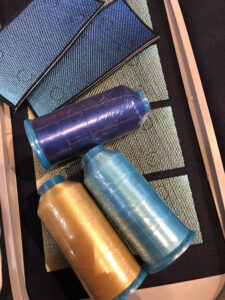
Thread, 2021. Photo by the artist.
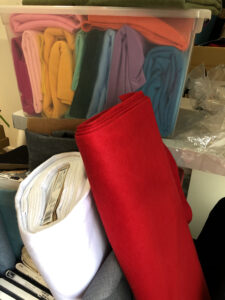
Felt for embroidery, 2021. Photo by the artist.
I am stitching on polyester felt on my smaller machine, a Brother 10-needle machine. Each stitch out makes 4 rectangles that must be trimmed, folded, ironed and drilled. That’s where I ran into problems! I have leather punches, but they would not cut through the felt and thread. I could cut out the holes with fine, sharp scissors, but my hands and forearm would not hold up to hundreds (thousands?) of hand cut holes. I did a little research and found a sailmaker’s drill and then learned how to keep it sharp.
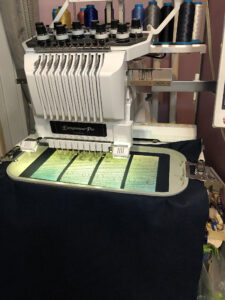
Machine embroidery, 2021. Photo by the artist.
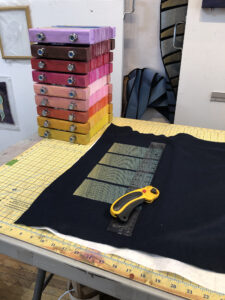
Cutting, 2021. Photo by the artist.
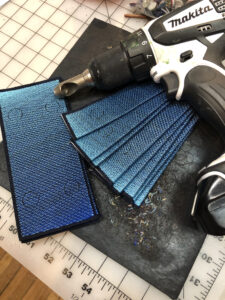
Fold and iron, 2021. Photo by the artist.
The Assembly
After about a week of stitching, I usually have enough pieces (72 folded & drilled rectangles) to begin assembly. I want the folded elements to be under pressure, clamped, so that the fore edges are well defined. To accomplish that, I used threaded rods, with split washers and locknuts, put through 2×2 wood pieces. The wood pieces are painted to reflect and accommodate the color effect of the threads on the particular color felt. The paint jobs are rarely a single color. I used matt Flashe vinyl paint, which has a heavy pigment load. Then the painted wood is sealed and polished with Renaissance Wax.
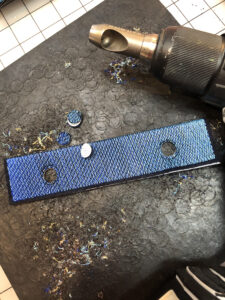
Drill, 2021. Photo by the artist.
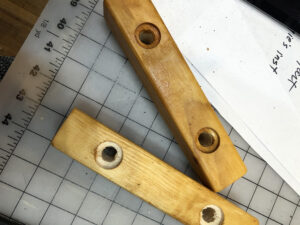
Woodworking end pieces, 2021. Photo by the artist.
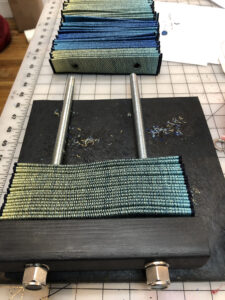
Assembly of Chromatic Bookblocks, 2021. Photo by the artist.
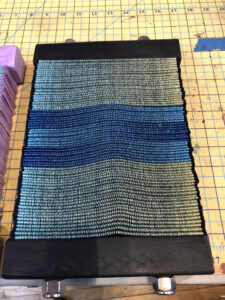
Finished module of Chromatic Bookblocks, 2021. Photo by the artist.
Today
I have, as of this writing. 16 modules, with nine colors to go. It continues to be an adventure. I am tempted to continue with three different colors of thread and see what happens next…
–Susan Hensel received her BFA from University of Michigan in 1972 with a double major in painting and sculpture and a concentration in ceramics. She has a history, to date, of over 200 exhibitions, 32 of them solo, twenty garnering awards. Hensel’s artwork is known and collected throughout the US, represented in collecting libraries and museums as disparate as the Museum of Modern Art in New York and Duke University Special Collections with major holdings at Minnesota Center for Book Arts and University of Colorado at Boulder.
Do you have a pandemic project to share with SDA? Check out our Blog Article Submission Form to let us know!
We know that this past year has been very trying and traumatic for so many people around the world. While we want to spotlight the work our members have been doing throughout the year, I (Lauren Sinner, SDA Managing Editor) wanted to take a second to say that it’s also ok if you haven’t been making work. The pandemic is not an artist residency, and you shouldn’t be expected to make great work during this time. There’s so much to process and deal with and it never seems to end, so please remember to take care of yourself, both mentally and physically.

2 Comments
Christine Aaron says
February 26, 2021 at 8:28 am
Wow. Beautifully illustrated and described but I yearn to see these in person! To really experience first hand the texture, light shifts and physical presences of these. Hoping one day! Thank you for sharing. Like you...I am a huge fan of the "what ifs"....they lead to so many interesting, exciting places!
Lisa-Anne Bauch says
March 12, 2021 at 9:35 am
Susan, these are gorgeous! Ephemeral with the changing light and color, and yet so satisfyingly solid and chunky. Like Christine, I wish I could experience them in person.